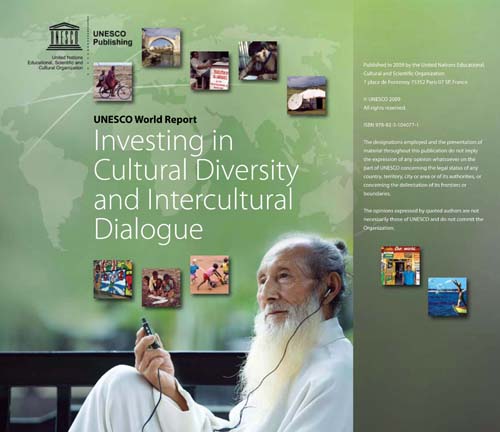The following summarizes the author's comments at a round table this week to launch UNESCO's World Report "Investing in Cultural Diversity and Intercultural Dialogue," to which she contributed recommendations on the need for media literacy programs. The round table was part of activities at the third United Nations' Alliance of Civilizations Forum in Rio de Janeiro, Brazil.
According to Chapter 5 of UNESCO's World Report "Investing in Cultural Diversity and Intercultural Dialogue" (http://portal.unesco.org/culture/en/ev.php-URL_ID=35396&URL_DO=DO_TOPIC&URL_SECTION=201.html), because the media and cultural industries have become highly dynamic sectors in economic, social and political terms, they are increasingly shaping individual and collective identities, worldviews, values and tastes in ways that challenge formal education systems.

New media and new forms of distribution facilitate greater access to content production and the dissemination of cultural content, the report said.
But asymmetries implicit in the digital divide continue to restrict opportunities for genuine cultural exchange, it noted.
Moreover, it said, the very multiplicity of choices and the cultural challenges they embody can result in cultural isolation as well as a proliferation of stereotypes.
Let's just take the example of Rima Fakih, who was crowned Miss USA 2010 this month.
I was asked to comment about the fuss on both sides of the issue on CNN that same week, notably that she is a 24-year-old Arab-American Shiite Muslim originally from south Lebanon, and proud of her origins.
Here we're dealing with stereotypes of Shiite Muslim women being veiled, usually crying over dead relatives or living in poor neighborhoods or villages noted for their conservatism, because that's how the media portray them, and that's the image that comes across.
Would it make any difference that the CNN producer who prepared me for the interview was a worldly, multi-lingual Shiite Lebanese woman with beautiful green eyes, who is not veiled and who goes to the beach to swim like all those beauties in Copacabana?
Rima Fakih comes from a culturally diverse society (Lebanon) and settled in another one (the United States) where she fulfilled her dreams. More power to her!
But for that, the blogosphere was abuzz with stories about "Sex and the Shiite," like the popular American TV show "Sex and the City," or headlines like "Rima Fakih: Terrorist in a Bikini?" That's downright bigoted.
Someone dug up the name Fakih, which is popular in south Lebanon, and linked it to Hezbollah, because they claimed someone from that family - and it could be a very distant relative Rima doesn't even know - is a member of the Party of God, ergo her connection to Hezbollah. I have a friend from the Fakih family and he is very liberal and drinks wine.
That's like saying anyone with an Irish last name of Adams is related to Gerry Adams of Sinn Fein fame and is an IRA terrorist. Imagine the outrage that would cause.
My approach to cultural diversity comes from years of experience as a reporter, foreign correspondent and editor, and later as someone who has taught journalism to undergraduates in university and who has trained professional journalists seeking to upgrade and update their skills and knowledge.
We start with simple and easy to remember rules: accuracy, fairness, balance and never making assumptions about people or things.
These rules depend on a basic element the media often overlook: critical thinking.
Critical thinking enables humans to discern, respect and accept cultural differences. It begins at home, where children pick up cues from their parents' behavior towards others; it is reinforced at school, where some of those behavioral patterns are manifested; and, increasingly, it has been influenced by the media, that play an all too pervasive role in our lives.
Parents who expose their children to different ethnicities, religions, languages and cultures should be credited for creating enlightened and tolerant citizens.
Being able to think critically in the media requires freedom to operate, to investigate and to disseminate the results of one's findings. Nowadays, it's done across various platforms through multi-media and social media channels.
To achieve such goals, those working in media have to be open to cultural diversity, be multilingual and be able to communicate past the loaded rhetoric that represents unilateral points of view.
Journalists must have the ability to ask questions and understand answers in a second language. It's imperative that any self-respecting journalist be fluent in two or more languages.
Unless journalists learn to decipher other people's languages, cultures, backgrounds and problems, they could be misled, or misleading.
In their attempts to beat the competition, produce exclusives, or just stay afloat financially in a fast-changing media landscape where technology and content are often confused, journalists are missing the point.
Yes, commercial interests are key, but content is still king. A story, is a story, is a story.
It's a prerequisite that we drill into journalists the understanding of nuances, of accents, of dialects, of body language, and of non-verbal communication, to ensure that these multi-directional reports are not lost in the global cacophony of messages.
Two of my favorite subjects in school were geography and history. I regret to say they've been marginalized, or swallowed up into other sexier-sounding topics of education.
The result is that today's journalists may fail to make the historical connection between events, thereby sidestepping the contextual references, or, refer to countries by their previous names and mix up racial and ethnic components.
In a worst-case scenario, these faux pas can lead to conflict or agitate already existing turmoil.
Other than linguistic and cultural accuracy is the matter of hype, when one blows things out of proportion or gives them undue attention.
The trick is not falling into the trap of stereotyping and racially profiling people by using loaded terms, unsuitable adjectives, or words that trivialize others' backgrounds.
Again, it takes hard work to filter through the bluster of warring factions, to fine-tune opposing points of view while doing them justice, to expose injustice without going overboard, and to create awareness where action is needed.
